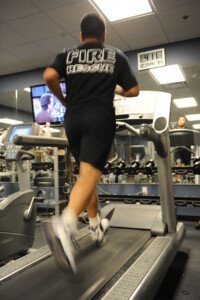
If your heart rate is still over 100 even after intense exercise, you need to find out why this is happening, because it shouldn’t be.
“Having an elevated heart rate for hours after intense exercise is not normal,” says Momina Mastoor, MD, a board certified cardiologist in Gettysburg, PA.
“Typically, we recommend that you exercise within 65 to 85 percent of your maximum heart rate.
“Your maximum heart rate is 220 minus your age. Once you stop exercising, your heartrate should drop rapidly and then it will continue dropping slowly.
“Generally, it takes one to 10 minutes for the heart to return to its resting state. People who exercise more frequently and are more fit will drop to their resting heart rate more quickly. We call this the heart rate recovery time.”
What Might It Mean if Heart Rate Is Over 100 Long After Intense Exercise Is Finished?
It most likely means that you’re out of shape. Your heart is not used to heart rate variability: the ability to bounce back to a normal rate soon after the challenging workout has ended.

Freepik.com
A scaled-down example would be running fast across a parking lot in the rain, and once in the car, you’re huffing and puffing.
But after half an hour of driving, your pulse is still elevated above normal.
Your heart doesn’t “know how” to efficiently recover from the exertion.
It hasn’t had much practice at recovery; not enough training.
If your heart rate is still going strong a few hours after completing your intense exercise session, it may also be anxiety that is somehow associated with hard workouts.
If you have health anxiety, it’s possible that this baseline anxiety may be kicking in after you finish a rigorous exercise session on a treadmill, stepper or outside at the local park.
Your session has long ended, but your pulse is still rapid – because the anxiety over your health had been triggered by your workout.
Your body is in fight-or-flee mode, and hence, your pulse is racing in anticipation of a fight or flight.
Are You Sure Your Heart Rate Is Over 100 in a Sustained Manner?
If you have health anxiety and keep taking your pulse at varying points after your workout is over, the anxiety may very well be what’s making it elevated.
And in between the measurements, it slows down.
Then with the next check, it’s racing again — due to anxiety over taking the check.
Whether you take it at the carotid artery in the neck or the radial artery in the wrist, anxiety will speed up your pulse rate.
If you’re taking a blood pressure reading at some point after finishing an intense exercise routine, a heart rate exceeding 100 will show up on the device if you have anxiety over your blood pressure (or anything at that moment).
However, if you’re worried about a high heart rate, it’ll be next to impossible to be calm, cool and relaxed when you take your pulse.
Sometimes, though, a fast heartbeat can be easily detected without measuring it. For some people, a pulse over 100 is easily felt inside the chest.
Another explanation is caffeine consumption after the exercise.
Back off on caffeine post-exercise if you suspect this is the culprit.
Arrhythmia
You may have read that exercise can trigger arrhythmia.
Usually, the erratic pulse is very short-lived, momentary, sometimes for only a handful of heartbeats — and may occur during the activity.
Furthermore, arrhythmia is an erratic pulse.
This is not the same as a steady heart rate over 100.
A steady and smooth heartbeat, even if rapid, is called sinus tachycardia.
It is not an arrhythmia. A normal heart rate is 60 to 100 beats per minute.
 Dr. Mastoor formally ran the Structural Heart Clinic at MedStar Union Memorial Hospital in Baltimore, MD.
Dr. Mastoor formally ran the Structural Heart Clinic at MedStar Union Memorial Hospital in Baltimore, MD.
 Lorra Garrick has been covering medical, fitness and cybersecurity topics for many years, having written thousands of articles for print magazines and websites, including as a ghostwriter. She’s also a former ACE-certified personal trainer.
Lorra Garrick has been covering medical, fitness and cybersecurity topics for many years, having written thousands of articles for print magazines and websites, including as a ghostwriter. She’s also a former ACE-certified personal trainer.









































